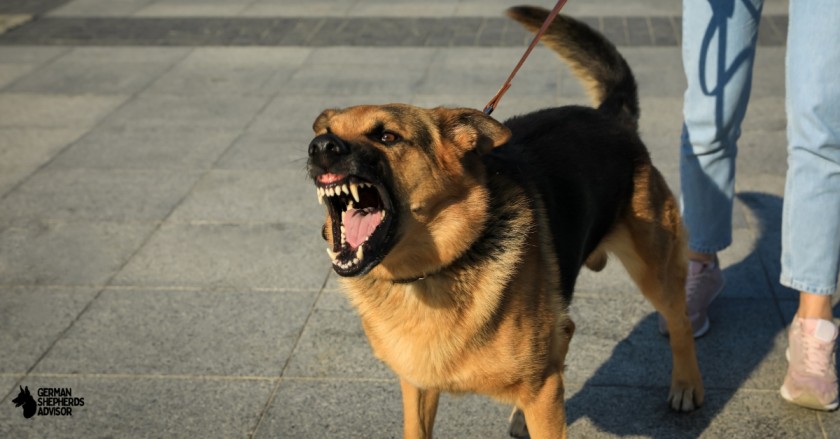One of the most common questions from German Shepherd owners is why my German Shepherd barks at other dogs. There are several possible reasons for this behavior, so let’s look at some of the most likely causes. Your German Shepherd may be barking at other dogs because he feels protective of you and your family. This is especially true if he is the only dog in the household. Dogs are naturally packed animals, so they have a strong instinct to protect their pack members. If your German Shepherd perceives another dog as threatening you or your family, he may bark to scare it away. This is why your friendly dog bark and Lunge at Other Dogs when They Are on a leash. German Shepherds are certified dogs by the American kennel club.
Reason behind the behavior!
There are a few different reasons why your German Shepherd might bark at other dogs. It could be that they’re feeling territorial, or they may simply be trying to get the other dog’s attention. If your Shepherd is unwanted barking aggressively, it’s important to make sure that they’re not feeling threatened in any way. If you think that their barking is just a way to get attention, try to redirect their focus onto something else – like a toy or treat. Ultimately, it’s important to understand why your dog is behaving in a certain way so that you can help them stop if necessary.
There are a few things you can do to help stop your dog from barking. One is to provide them with plenty of toys and chew toys so they have something to occupy their time. You might also want to try training your dog with positive reinforcement, such as rewarding them when they bark less. Finally, you can try using anti-barking collars or devices that emit a high-pitched noise when your dog starts barking. Whatever method you use, be consistent and patient, and eventually your dog should learn to stop barking excessively.
Tips
There are a number of things you can do to help stop your dog from barking. First, make sure that he has plenty of exercise and is well-stimulated. A tired dog is much less likely to bark than one who is full of energy. Secondly, try to figure out what is causing him to bark and address that issue. For example, if he barks when someone comes to the door, provide him with a cue (such as sit) that he can use to greet people instead of barking. Finally, be consistent in your management of his barking – if you allow him to bark sometimes, he will continue to bark when he wants attention. If you consistently provide him with alternative behaviors
Another tip is to make sure they are getting enough mental stimulation. This can be in the form of puzzle toys, food puzzles, or even training games. Keep their minds active and engaged so they don’t have time to bark!
Finally, consider using positive reinforcement when your dog is quiet. This could mean treats, petting, or even verbal praise. provide your German Shepherd with plenty of toys and chew toys to keep him occupied and distracted from whatever it is that’s causing him to bark. Finally, if all else fails, you can always seek the help of a professional trainer or behaviorist to help put an end to your GSd barking once and for all.
Obedience training
There are a few things to keep in mind when training your dog obedience. First, always be consistent with your commands. If you use different words for the same command, or give different commands for the same behavior, your dog will become confused and will not respond correctly. Second, use positive reinforcement when your dog performs the desired calm behavior. This could include treats, petting, or verbal praise. Third, avoid using punishment as a means of training. Not only is this ineffective, but it can also lead to behavioral problems down the road.If you keep these tips in mind, you’ll be well on your way to teaching your dog obedience!
Anti barking collar
Choosing the right anti bark collar for your dog can be tricky. There are many different types and brands on the market, and it’s important to find one that is well suited for your dog’s specific needs. In this article, we’ll help you choose the best anti bark collar for your dog by discussing the different features to look for and how to use them properly. When you remove the collar, it’s pretty common for dogs to revert to their previous barking behavior.
When choosing an anti bark collar, the first thing you need to consider is what type of barking your dog does. If your dog only barks when he or she is excited or playing, then a Citronella spray collar may be the best option. These collars work by emitting a burst of citronella oil whenever the dog barks.If you’re looking for a way to stop your dog’s incessant barking, an anti-bark collar may be the perfect solution. Anti-bark collars are designed to give your dog a mild shock or vibration when they bark, which quickly trains them to stop the behavior.
There are a few things you should keep in mind when shopping for an anti-bark collar, such as what type of collar is best for your dog’s size and personality. You’ll also want to consider how much you’re willing to spend on a collar, as prices can range from around $30 to $100 or more.

To help you find the best anti-bark collar for your pup, we’ve rounded up the top-rated options on the market.From basic collars to those with advanced features like BarkLimiter technology, there’s an option for every dog on our list. And, since some collars come with a remote control, you can even train your dog from afar.
Ignoring
Do you have a dog that barks excessively? If so, you’re probably looking for ways to get them to stop. Here are a few tips:
Try to ignore the barking
This can be difficult, but it’s important not to give in and reward the behavior with attention.If you must address the barking, do so in a calm and assertive voice. Avoid yelling, which will only excite your dog more.
- Give your dog plenty of exercise. A tired dog is less likely to bark unnecessarily.
- Provide your dog with toys and chews that keep them occupied and distracted from the things that trigger their barking.
- With a little patience and consistency, you can train your gsd to bark less and enjoy a quieter home.
Dominance of GSD
GSD is the most popular dog breed in the world. They are loyal, loving, and intelligent dogs that make great family pets. However, GSDs can also be dominant and aggressive if not properly trained and socialized. It is important to understand your dog’s personality and needs in order to ensure a happy and healthy relationship.GSDs are known for their loyalty, and they will often form strong bonds with their owners. This means that they may be protective of their family and home, and may become aggressive if they feel threatened. It is important to socialize your GSD from a young age so that they learn to interact appropriately with other people and animals. Proper training is also essential to help your dog learn how to behave in different situations.While GSDs can make great family pets, they are not right for everyone. If you are considering adding a GSD to your family, be sure to do your research and consult with a qualified trainer or behaviorist to ensure that this breed is a good fit for your home.
Train them to listen commands
When it comes to German Shepherd training program, you will want to make sure that you are using positive training. This means that you should reward your dog for good behavior, rather than punishing them for bad behavior. With proper training, your German Shepherd can learn to obey commands and behave well in a variety of situations. Keep reading to learn more about how to train your German Shepherd.
One of the most important things to remember when training your German Shepherd is that consistency is key. You will need to be consistent with the commands that you give, as well as the rewards or punishments that you use. If you are not consistent, your dog will quickly become confused and may start to behave in ways that you do not want them.
Stress and anxiety barking
Stress and separation anxiety barking can often manifest in our pets in different ways, including excessive barking. While it may seem like your dog is just being annoying, they may actually be experiencing a great deal of stress and anxiety. If you notice that your dog is barking more than usual, it’s important to take some time to figure out what might be causing the problem. Only then can you begin to address the issue and help your furry friend feel better.
There are a number of possible reasons why your dog might be stressed or anxious, including:

Separation anxiety:
This is one of the most common causes of stress and anxiety in dogs. If your dog is used to being around people all the time, they may start to feel anxious when left alone. This can often manifest as excessive barking.
Fear of loud noises:
Dogs can be scared of all sorts of things, including loud noises. If your dog is afraid of thunderstorms or fireworks, for example, they may start to bark excessively during these times.
Fear of other animals:
If your dog is not used to being around other animals, they may become stressed and anxious when they are in close proximity to them. This can often lead to excessive barking as well.
Boredom:
Just like us, dogs can get bored too. If they don’t have anything to do, they may start to bark out of sheer boredom. This is often the case with dogs who are left alone for long periods of time.
If you think that your dog’s barking may be due to stress or anxiety, there are a few things you can do to help them feel better.
Make sure they have plenty of exercise:
A tired dog is a happy dog. If your dog has pent up energy, they may start to bark out of frustration. Make sure to give them plenty of opportunities to run and play so they can burn off some steam.
provide mental stimulation:
In addition to physical exercise, dogs also need mental stimulation. This can come in the form of puzzle toys, training sessions, or even just playing fetch. giving your dog something to do will help keep their mind occupied and prevent boredom barking.
Address the underlying cause:
If your dog is barking due to separation anxiety, for example, you’ll need to work on addressing that issue specifically. This may involve things like leaving them with a Kong toy filled with treats or training them to stay calm when you leave the house.
If you’re not sure what’s causing your dog’s stress and anxiety, it’s always best to consult with a veterinarian or animal behaviorist. They will be able to help you pinpoint the problem and come up with a plan to help your dog feel better.
FAQS
Why is my German Shepherd barking at other dogs so much?
They are defending their territory.
Dogs are territorial and will always bark if their area is threatened. The barking will usually intensify as the threat approaches. The body language of your German Shepherd will be hostile, with a raised tail and elevated hackles along the spine.
Why are GSDs so whiny?
German Shepherds were trained to be herders and guard dogs, so they had to learn how to grab their owners’ attention instinctively in order to defend the herd. As a result, German Shepherds are more inclined than other breeds to whine, bark, howl, and growl owing to their herding background.

